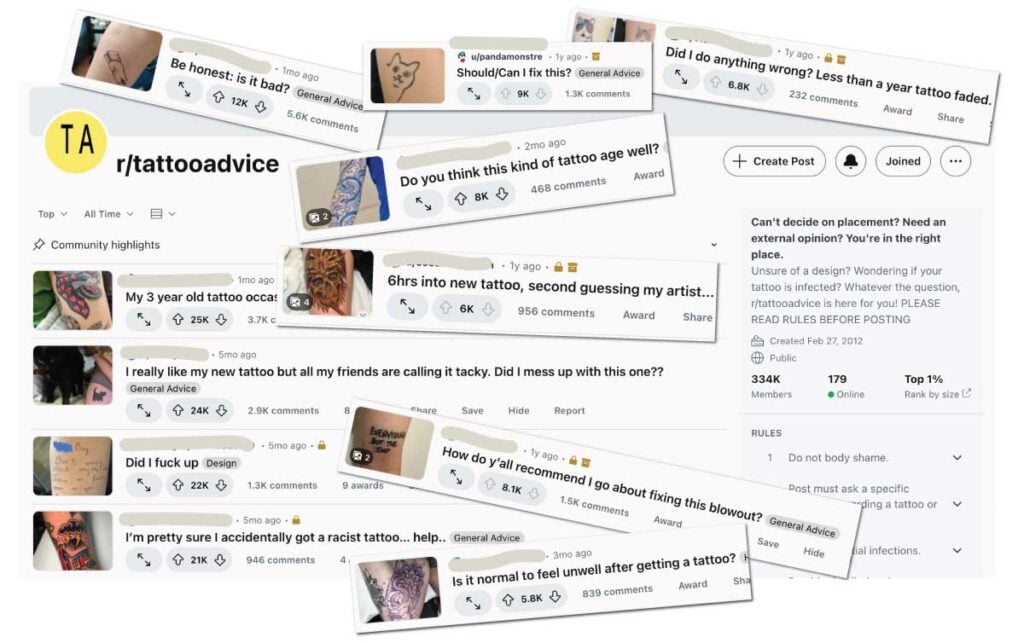Regret: grief; sorrow; pain of mind; dislike; aversion.
Regret, at the best of times, is a challenging feeling to sit with. When you have a daily reminder of it through the tattoos on your skin, it becomes even more difficult. Whether it’s a nagging feeling of dislike or an all-consuming grief and disappointment, you shouldn’t have to feel this way about your markings.
It’s early days here at the Tattoo Pathway, but our first small survey with 68 respondents from 16 countries reveals that almost 1 in 2 people (47%) have experienced tattoo regret at some stage. That’s a high probability. As tattoos become more accessible and widely accepted, an increasing number of people are finding themselves grappling with the unexpected reality of tattoo regret.
Getting tattooed can dramatically impact how you feel about yourself, your body, your relationships, and your confidence in showing up in the world. On top of that, most of us aren’t given any guidance on what to consider before getting tattooed or the layers of change we will experience. It’s almost like signing a lifelong contract without reading the fine print.
With all this in mind, in today’s post, we’re not only going to look into some insightful stats about tattoo regret and ways you can safeguard yourself from future regret. We’ll also explore how others have overcome their tattoo regret and share tools to help you do the same, transforming misaligned tattoos into something as valuable as alluvial gold.
Tattoo Regret – The Stats & How to Avoid It
We all like stats. So let’s jump straight into it.
In total, 47% of our survey participants have experienced tattoo regret in some form:
- 18% of people currently regret a tattoo.
- 22% of people used to regret a tattoo but no longer do.
- 7% both currently regret a tattoo and used to regret a different tattoo that they no longer do.
Of the 25% of people who currently regret a tattoo:
- One third (33%) experienced immediate regret, straight after receiving the tattoo.
- 56% regretted their tattoo within weeks.
- 72% regretted their tattoo within the first year.
More than half of these tattoos (61%) were done under the age of 25. What this tells us is that most people regret their tattoos within a year of receiving them, especially if they got them when they were under 25.
So, what are the key reasons behind this regret?
Our survey showed 15 distinct reasons why people still regret their tattoos, but a few main reasons dominated:
- Meaning has changed: 47% of survey participants reported regretting their tattoo because they feel differently about the meaning of the tattoo now compared to when they got it.
- Placement: 41% regret their tattoo because of where they got it done on their body.
- Technical: 41% regret their tattoo because they are not happy with how it looks technically.
- Misaligned expectations: 41% regret their tattoo because it didn’t match their expectations or what they envisioned it would look like.
- Artist input: 24% regret their tattoo because the artist had too much input into the design.
Other reasons reported include:
- Not speaking up in the session about disliking the design.
- Getting covered too quickly and wanting different things now.
- Trying to fit in.
- Being under the influence.
- The tattoo developing a stereotype (e.g., tramp stamp).
- The character of the tattoo artist.
- Lack of consideration.
- The future consequences of the tattoo.
Reddit Tattoo Advice Analysis
Out of curiosity, I wondered how our survey results lined up against public discussion. I analyzed the top 50 posts of all time from the tattoo advice forum on Reddit, which has over 303K members, to identify the main reasons for tattoo regret and challenges.

I categorized each of the 50 posts based on the main themes people ask for advice on. Many posts could easily fall into multiple categories – like wanting reassurance, being unhappy with the design or placement, feeling the artist had too much control, or making a rushed decision – but to keep things straightforward, I placed each post into just one category.
Below are a few quotes to share real-life experiences and emotions people have faced. If you’re interested in a more detailed breakdown, let me know – I’d love to explore this more in another post.
| Category | No. People | Quotes from Reddit |
|---|---|---|
| Wanting reassurance after receiving the tattoo | 14 (28%) | “Did I mess up? I created a design I thought I wanted… Was/is this dumb?… I didn’t think this through better.” “I think I’m having some tattoo shock/regret. This is much larger and darker than I anticipated. Does it look terrible? I’m panicking. Opinions?” |
| Asking for input on tattoo design, placement, style, aesthetic pre-tattoo | 12 (24%) | “Do you think this kind of tattoo ages well? I follow this artist on Instagram.. They posted this Asian style tattoo.” |
| Post-tattoo care | 8 (16%) | “Is this the start of an infection… just want to make sure so it doesn’t mess up tattoo.” |
| Explicit regret of design choice following tattoo | 5 (10%) | “I recently got a hand tattoo to cover up another tattoo and I am now having second thoughts. Should I remove it completely or accept it?” |
| Not happy with how the tattoo technically looks | 5 (10%) | “Can I fix this? It’s been a year and the lines bother me. Am I right?” |
| Asking for general advice on getting a tattoo or tattooing | 5 (10%) | “I’m 32 and getting a half sleeve. How do I deal with how much this will disappoint my parents?” |
| Concerned about placement following tattoo | 1 (2%) | “Recently got my first tattoo! Am I overthinking the placement of it?” |
While not all of the top 50 posts are explicitly linked to regret, there are some interesting insights we can draw from this analysis.
Negative Impact on Mind and Body
In many cases, receiving a tattoo negatively impacts how people feel, including stress, anxiety, overthinking, embarrassment, self-consciousness, and regret. This shows how the design, placement, and look of a tattoo, as well as the experience of being tattooed, can influence you not just physically, but emotionally and mentally too.
Influenced by Others’ Opinions
We can also observe that how people feel about their tattoos is often heavily influenced by what others think or what they fear others might think. Similarly, many people sought others’ opinions on the design of their tattoo before getting it. In both cases, there’s a noticeable external orientation.
It’s natural, if not beneficial, to think about how receiving a tattoo will lead to changes in both your inner and external world – both of which do change. However, if you find yourself in this position, it’s important to ask: Are your reasons for getting tattooed truly your own, or are they too heavily shaped by outside influences? What are the reasons for feeling insecure or unsure about your decisions? We’ll touch more on this soon; however, it’s an important consideration that can influence whether or not you experience tattoo regret.
Trends in Regret
Similar to the results from our survey, common themes emerged around tattoo regret or challenges due to the design, meaning, placement, look of the tattoo, and misaligned expectations, as well as people experiencing regret immediately or soon after receiving their tattoo. This suggests shared reasons for why people regret their tattoos that we need to pay attention to.
The Most Important Insight
Understanding the nuanced and shared tattoo experiences of people was interesting, but what stood out the most from this analysis was the evident lack of guidance available for people looking to get tattooed, which is why so many turn to the internet for advice.
People are seeking advice about a single tattoo experience, yes, but this indicates a broader lack of guidance on the entire process of being tattooed – how and why to choose a specific tattoo design and placement, how to deal with the changes and transformation that follow getting a tattoo, and the inevitable unknowns you will face.
This is the key observation from this analysis – the lack of guidance in tattooing.
Most of us don’t have guidance. I didn’t for the first 10 years of being tattooed. Because that’s not what our current tattoo culture is. In our mainstream tattoo culture, we don’t have a shared understanding of why people get tattooed, how to approach it, or the significance of the experience and transformation that follows.
So, while we might not have all the answers here at the Tattoo Pathway, we believe we can provide you with some sound guidance so that you can make more informed decisions, reduce tattoo regret, and wear tattoos that remain meaningful over time.
Guidance to Avoid Tattoo Regret
They say hindsight is 20-20 vision, and we can thank our survey participants and people on Reddit for sharing their experiences and providing us with valuable insights into what we should consider before getting a tattoo.
For each top reason for tattoo regret, we’re sharing a key tip from our Tattoo Pathway Fundamentals course to help you choose tattoos that maintain lasting significance.
1. The meaning has changed and no longer resonates:
Take time to understand your motivation for getting tattooed before focusing on the specific tattoo you want. Ask yourself, “Why do I want to get tattooed?”
Only once you’re super clear on this should you move to asking, “Why do I want to get this tattoo?”
Be honest with yourself…
Is it to look cool?
Fit in?
Because your friends are doing it?
To rebel?
To create a specific image or persona?
For revenge?
To be funny?
To fill space on your body?
Or, is it to mark something significant about yourself or your life? I now like to think of my tattoos as something that I earn through the lived experience of my life.
The more honest you are in this line of inquiry, the more likely you are to get a tattoo that sustains significance over time.
2. Placement
Where you get tattooed can have a significant impact on your experiences afterward and whether you end up regretting or disliking your tattoo.
When planning your tattoo, consider the types of changes and experiences you could have based on the location – both internally and externally. For example, a neck tattoo will likely lead to different internal processes and external perceptions compared to a tattoo on your hip.
3. Technical
Whether you’re happy with how your tattoo looks depends largely on the skill of the artist you choose. Take time to research the artist. At Tattoo Pathway, we talk about creating a green light list and a red light list – what are your absolute needs and deal breakers for working with someone?
4. Misaligned expectations:
The relationship with the artist is crucial to bringing your vision to life. Communication and collaboration between you and the artist are important factors that can influence how your tattoo is executed. Ask yourself:
- Does the artist work with you to create a tattoo that reflects your reasons for getting tattooed?
- Does the artist respect your reasons for getting tattooed?
- Do you feel heard or dismissed?
Understand your own expectations. Tattoos grounded in deep meaning are less likely to lead to regret if the final result differs from your initial vision. A strong need for control may lead to disappointment if the tattoo doesn’t perfectly match your expectations.
5. Artist input
It is often positive when an artist offers guidance to execute your tattoo in a way that is better for you. Problems arise when the artist is focused more on showcasing their style, dismisses your concerns, or is in a rush.
Take your time choosing an artist. Create your green and red light lists, and assess whether the relationship feels supportive of how you want your tattoo experience to be.
The Secret Ingredient
To prevent tattoo regret, take your time. Most people regret their tattoos within a year of receiving them, especially if they got them when they were under 25. There is no rush. If you feel a rush, take time to question why – it may reveal a reason for getting tattooed that is not in your best interest and may lead to regret.
Reframing Tattoo Regret into Alluvial Gold
Preventing tattoo regret is one thing, but what if you have a tattoo that you currently regret?
Our survey tells us that there are ways you can move past tattoo regret. Of the 47% of respondents who reported regretting one of their tattoos at some stage, 62.5% found a way to move past tattoo regret – showing a possible pathway of change and transformation.
It’s worth noting that the reasons they regretted their tattoo in the first place echoes the reasons we have already discussed in this article so far. For example, one participant said, “I don’t regret getting the tattoo, just the placement”, and another, “I just didn’t like the way it looked”.
Similar to my reddit analysis earlier, I’ve categorised our participants’ responses to understand how they moved past tattoo regret. The findings highlight five main reasons why people have let go of their past regrets.
These reasons tell us that people often come to move past tattoo regret by understanding how their tattoo fits into their broader life journey, accepting their past decisions and former versions of self, learning from the experience, covering the tattoo, or simply giving it time to become a natural part of their story. Many of these shifts are grounded in a process of reflection and integration.
At the Tattoo Pathway, we guide you through a powerful process of reflection to connect with the deeper meaning within each tattoo. This approach helps you understand why you got each tattoo, what it portrays, how it fits into your broader life journey, and whether it aligns with who you are now. We share these methods in our community and through our Fundamentals Course, designed to help you embrace each tattoo’s role in your personal growth and reduce future regret. Find out more about our Tattoo Fundamentals Course here.
Sometimes, taking yourself through this process and accessing this information is enough for you to move past tattoo regret, and other times it leads to a decision to cover up or rework the tattoo so it feels more aligned with who you are now. The valuable information you receive from this process, the alluvial gold so to speak, can also be used to guide you to choose future tattoos that feel empowering, aligned and in harmony with your life – therefore reducing, if not eliminating, tattoo regret. It’s using information from the past, to understand where you are now, to guide future decisions and actions with intention.
Final Thoughts
Tattoo regret arises from a variety of personal experiences, both before, during, and after getting a tattoo. We’ve identified common reasons for regret, highlighting the importance of taking your time to consider:
- Motivations.
- Desired placement.
- The artist’s technical skill.
- Your expectations.
- The relationship with your artist.
There are also ways to move past tattoo regret, often through a process of reflection, acceptance, and integration.
At Tattoo Pathway, we’re passionate about connecting people to the transformational power of tattooing and providing guidance on how to navigate this journey. If you are seeking a more meaningful tattoo experience or wish to understand and move past any tattoo regret, feel free to reach out! We’d love to hear from you.


